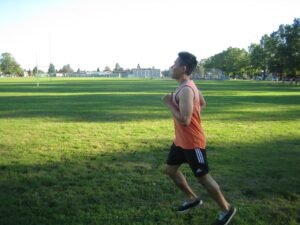Dehydration involves excessive water loss from the body. This can occur for various reasons such as certain illnesses, diseases affecting the gastrointestinal tract, failure to take on adequate volume of fluids and excessive sweating.
When the individual engages in sports and exercise, training and competing in warm environments are the common causes of dehydration. During exercise, the body produces sweat. This is how the body maintains a low body temperature. When the individual engages in exercise, the body releases more moisture through the breath due to the increased rate of respiration. There are measures that you have to perform if an individual is suspected with mild dehydration. To learn to recognize and manage the early indications of dehydration, sign up for a first aid class with a credible provider near you.

How dehydration affects performance
The fluid that is lost via breath and sweat should be replaced so that the body can maintain the same level of performance. A 2% reduction in the body weight through water loss can lead to detrimental effects which will reduce the level of performance. Remember that both mental and physical performance is known to worsen dehydration. The following are the usual symptoms of dehydration:
- Elevated heart rate
- Slowed reaction time
- Impaired aerobic capacity
- Impaired judgment
- Diminished concentration and decision making
Once the water level within the body drops, this will cause the blood volume to reduce which leads to the thickening of the blood. This will add extra strain on the cardiovascular system and ensuing increase in the heart rate in order to maintain sufficient blood supply to the functioning organs and muscles.
As the blood volume drops further, blood is diverted away from the inactive organs and towards the contracting muscles. The reduced amount of blood at the skin reduces the sweating response. This will lead to a further increase in the body temperature and if not lowered, will lead to heat stroke.
Prevention of dehydration
The ideal way to prevent dehydration is to regularly take fluids throughout the training or event. Always bear in mind that the individual should not wait until he/she feels thirsty before having a drink due to two reasons. First, while exercising, the feeling of thirst is usually masked. Second, feeling thirsty is an indication that the individual is dehydrated.
There are various sports drinks available that claim to be more effective in maintaining hydration as well as improving performance than drinking plain water alone. The electrolytes are vital for various physiological functions in the body, including muscle contraction. The presence of electrolytes in sports drink will replace the electrolytes lost in sweat and also helps reduce the risk of developing hyponatremia. Many sports drinks often contain carbohydrates to provide an energy source.
General guide in the intake of fluids
- 10-15 oz. at 2-3 hours before exercise
- 8-10 oz. at 15 minutes before exercise
- 8-10 oz. every 15 minutes during exercise
Another way to determine the level of dehydration is to monitor the color and strength of the urine. If the individual has dark, yellow, strong-smelling urine, it indicates dehydration.
